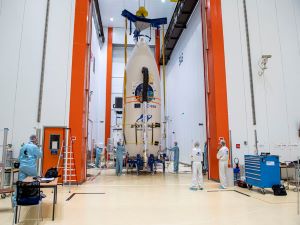We have lift off!

VEGA Flight VV16 capsule is manned for spaceflight
GHGSat’s new satellite, Iris, launched successfully into orbit on the evening of September 2, after delays to poor weather conditions. The new emissions-hunting satellite launched from the Guiana Space Centre in Kourou, French Guiana and was broadcasted via live stream.
LOOKNorth has been in partnership with GHGSat for several years, supporting the sensor validation of their first satellite mission and the development of a hybrid aircraft-satellite monitoring system which expanded GHGSat’s monitoring capabilities into Central Asia. We also provide ground station support with our sites in Inuvik, Northwest Territories and the soon-to-be-launched Happy Valley-Goose Bay, Labrador location.
Much like her sister satellite, Claire, which has been in orbit for four years, Iris will monitor greenhouse gas levels at various locations on Earth. With resolution 100x higher than any other gas-monitoring satellite, Iris is capable of pinpointing the source of emissions, such as individual oil and gas wells. Claire and Iris will work in tandem to generate the most accurate depiction of the Earth’s greenhouse gas emissions, giving GHGSat a global edge over their competition.
Iris was launched along with 52 other small satellites crafted by 21 different companies, on the Arianespace Vega Flight VV16. Vessels like these are used to launch microsatellites and smaller-scale satellites into orbit. Stephane Germain, CEO of GHGSAT said “Iris marks the next step for GHGSat. Ten times better performance while doubling our satellite capacity, adding aircraft remote-sensing services, and further developing on our analytics; we can now facilitate methane monitoring for more clients worldwide.”
In addition to this major accomplishment, GHGSat secured a $14M investment from the Ministère de l’Économie et de l’Innovation du Québec earlier this summer and became the first space company winner of BloombergNEF’s 2020 Pioneer Competition, which recognizes companies that are leading the way to a carbon-reduced economy.
LOOKNorth is proud to partner with GHGSat and supports their important mission of reducing global carbon emissions. For more information about the Iris project, visit https://www.ghgsat.com/our-platforms/iris/.
